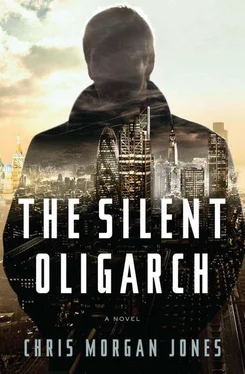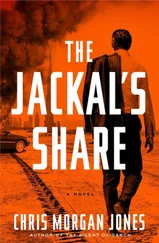“Faringdon is a private energy business that invests in oil and gas in the former Soviet Union. We own stakes in companies in Russia and Kazakhstan, mainly.”
“And what is the turnover of the group?”
“That’s commercially confidential. I would prefer not to answer that.”
From the end of the table Kesler gave a small nod of approval.
Across from Lock, Griffin resumed. “And what is your role in the company, Mr. Lock?”
“I am a shareholder.”
“The sole shareholder?”
“I would prefer not to answer that. I own a majority holding in the company. That shareholding is structured through various offshore companies in order to minimize my tax obligations.”
“Legitimately minimize,” said Kesler.
“Sorry, legitimately minimize my tax obligations. I don’t see that the exact shareholding structure is relevant to Mr. Tourna’s claim. I own a majority position and am authorized to speak on behalf of all shareholders.”
“Good,” said Kesler. “OK. That’s how it’s likely to start. If I was Greene I’d want to look at your career, the founding of Faringdon, how it’s grown. I’d leave the charges until last. That’s probably how he’ll play it. Now the main thing to remember is not to be drawn on ownership, not to be drawn on financing. Stick to the version we’ve established. Let’s deal with the background now. We can go through the charges tomorrow. Lawrence, please continue.”
It was Friday, and Lock was back in the offices of Bryson Joyce drinking his second cup of stale coffee. He, Kesler and Griffin sat around a table in a small, hot meeting room. Thursday had been final coaching; today and tomorrow, mock questioning; Monday, Paris. He would have preferred to have been anywhere else. Kesler was annoying him. His manner was now openly critical. He, thought Lock, is the despairing impresario to my talentless gangster’s moll. Every mistake Lock made he felt less like the client and more like a liability. If this exercise was meant to give him confidence it seemed set to fail.
At least this was work, and at least this was London, and the two together helped to distract him from Oksana. He was surprised by how keenly he felt the loss of her; he had expected that arrangement to be easier to break. But what hurt more, of course, was that she was right, as Marina had been, and blunt, as Marina had not.
“So, Mr. Lock. Can you help us all, please, by giving an account of your career to date? It would be useful to know how you came to Russia and what business you have had there.”
The problem is, thought Lock, that Griffin is being much too polite. Will it be this genteel on Monday? Presumably Lionel Greene didn’t get to be the man he is by talking to his witness like the local parson. Nevertheless, as Lock went through his answers he didn’t mind. Overall he would rather be roughed up only once.
And so the day went on, Griffin asking neat questions and Lock delivering neat answers. After an hour or so Lock’s mouth was dry and he had become conscious of the flat monotone of his voice. Two days of this.
“And how would you describe yourself, Mr. Lock? In business terms.” Griffin seemed to be enjoying calling him Mr. Lock.
“What do you mean?”
“I mean, what sort of a businessman are you?”
“I’m a private equity investor. I invest in private companies at any stage of their history. Usually I take a majority stake. While I hold my investments I work with the management of the company to optimize value.” All carefully scripted, to within an inch of being meaningless.
AT LUNCH, Lock left Bryson’s office and walked toward the Barbican, which rose boldly above the City like the relic of some strange and ancient civilization. He lit a cigarette, regretted it instantly and stubbed it out. The day was gray and warm. He called Marina—he should have called her yesterday but he hadn’t felt like talking to anyone. A piercing, scrambled digital squall began the call and then the line went dead. He tried again and reached her voice mail straightaway.
“Hi, it’s me. I got in late last night. Call me. I… I’d like to take you to dinner. Tomorrow? I’ve been thinking about what you said when I was here last. Love to Vika.” It felt strange to be talking about normal things after so long with Kesler. Reluctantly he took himself back to the office, and the barrage continued.
“Can you please describe your relationship with Konstantin Malin?”
“I know him. Anyone who has worked in Russian energy knows him.”
“Would you say that he was a friend of yours?”
“A strong acquaintance, I would say.” Kesler’s phrase.
“I see. So you have met Mr. Malin?”
“Of course, a number of times.”
“Have you ever done business together?”
“Not personally, no. Faringdon has many dealings with the Ministry of Industry and Energy where Mr. Malin works.”
“So Faringdon has never profited from a close relationship with Mr. Malin?”
“Certainly not.”
“Really? Your paths certainly seem to cross often enough. Let’s take Sibirskenergo ZAO. This is a Faringdon company, yes?”
“We own sixty-eight percent.”
“We?” Kesler interjected.
“Sorry.” Lock took a breath. “Faringdon owns sixty-eight percent.”
Griffin resumed. “What does it do? Sibirskenergo.”
“It explores inaccessible oil properties in the far north of Siberia. Skip, why are we doing this? We didn’t prepare for this.”
“You won’t be prepared for everything. That’s the point. Carry on, Lawrence.”
“And in 2006 Sibirskenergo won how many exploration licenses in that territory?”
“Skip, I don’t see the relevance of this.”
“You will. You do. Carry on.”
“How many licenses?”
“Four.”
“Who had previously owned the licenses?”
“A state-run company called Neftenergo.”
“And how many companies competed for the licenses when Neftenergo decided to sell them?”
“None. Well, one.”
“Only Sibirskenergo?”
“Yes.”
“For state-owned assets.”
“Yes.”
“How much was paid? For all four.”
“I’m not at liberty to say. I don’t recall.”
“Which? You can’t say or you don’t know?”
“I can’t say.” Lock looked over at Kesler, but Kesler merely nodded at Griffin to continue.
“Does it strike you as unusual, Mr. Lock, that four highly valuable licenses should be sold to your company without competition?”
“No. I think that’s quite normal in Russia.”
“Indeed? Even though it contravenes all guidelines for the sale of state assets?”
Lock had no answer.
“Mr. Lock, can you tell me which ministry oversaw the sale of the licenses?”
“The Ministry of Industry and Energy.”
“Where Mr. Malin works?”
“Yes.”
“Thank you, Mr. Lock.” Griffin looked at Kesler.
“You see, Richard?” Kesler was somewhere between exasperated and triumphant. “You never told us about those licenses. Can you tell me why?”
“I’d forgotten all about it. It didn’t seem relevant.”
“Now, Richard, right there is something you’re going to have to stop, by the way. Either you forgot or it wasn’t relevant. Either you can’t say or you don’t know. It can’t be both. Say one thing, then stop. Be clear. Understand?”
Lock sighed. He was tired of being scolded. “Yes. I understand.”
“Now what you say, in this situation, is that you can’t recall exactly how much the company paid for the licenses—you’re too important to know such details—but it was a market rate and you believe that the Russian Audit Chamber approved it. If the tribunal requires exact figures you will get back to them.”
Читать дальше












